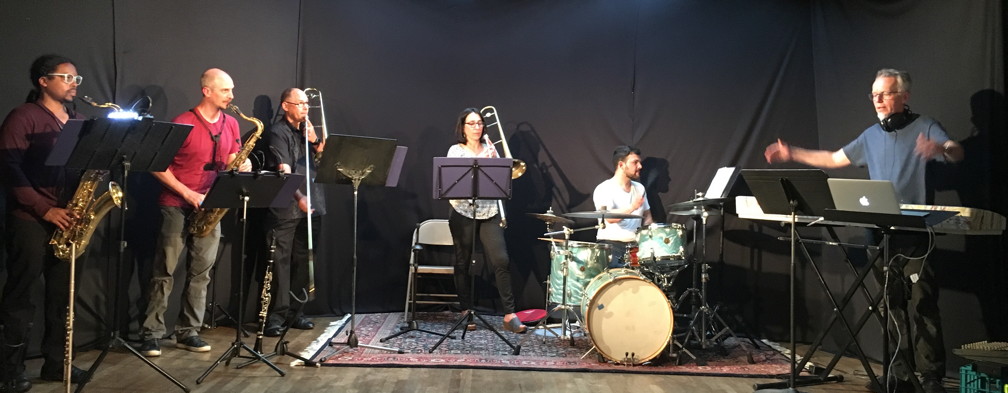
About the music
The Incendiary Cycle is music of place, and that place is California. It is music about people, nature, industry and the dynamic relationships between them.
The Incendiary Cycle takes its inspiration from pyrogenic vegetation, native plants that require fire to germinate, The ensemble translates the dynamics of California‘s social, industrial and environmental forces onto a six piece ensemble of saxophones, trombones, drums and keyboard. It is music about conflict, transformation, nostalgia, loss and rebirth.
In California we live in a metastasizing industrial civilization, yet we also celebrate what is left of our dramatic natural endowment. In the California mountains, fire clears out dead wood and germinates the seeds of new growth. Fire once drove steam locomotives and Kaiser Steel. Now the steel mill and the steam engines are gone, along with the orange groves and the aerospace plants, replaced by vineyards and high tech. Our relationship to nature is both adversarial and symbiotic. Our ongoing struggle with fires, floods and earthquakes continues to validate our self-image as pioneers and innovators.
Gary Synder, in The Etiquette of Freedom,
"A frontier is a burning edge, a frazzle, a strange market zone between two utterly different worlds."
Joan Didion wrote in Where I Was From,
“To be a Californian was to see oneself, … as affected only by ‘nature,’ which in turn was seen to exist simultaneously as a source of inspiration or renewal (‘Born again!’ John Muir noted in the journal of his first trip to Yosemite) and as the ultimate brute reckoning, the force that by guaranteeing destruction gave the place its perilous beauty.”
Personel
Ted Allen, composer, electronics, tromboneZack Pitt-Smith, tenor sax, clarinet
Sean Norris, composer, tenor sax, flute, electronics
Mara Fox, trombone
Dan Andrade, trombone
Isaac Schwartz, drums
Projects
Gold Rush
The Clearing
"The Clearing" opens with Stephen Meadows' reading a poem describing crickets sounding like "a not quite monotonous jazz." His recorded voice is accompanied by brushes on snare drum and a rhythmically processed cricket sample recorded at Grass Valley, California in September 2018.Tule Lake
Tule Lake, on the northern border of California, is both a place of great natural beauty and place of human conflict and sadness. The remote lake, in a high desert landscape of lava flows and pinyon juniper forest is good place for watching and listening to birds. It was also the site of the Modoc War in1872-1873 and the Tule Lake Segregation Center from 1942 to 1946. "Tule Lake" attempts to resolve the dissonance between the human and natural history of this place.Kelso
Starting in 1905, the Union Pacific Railroad used Kelso Depot in the Mojave Desert to add extra steam locomotives to trains approaching Kessler Summit. Later, in 1924, the railroad added a restaurant and hotel rooms for passengers. With the advent of diesel locomotives, the depot became obsolete. The site is now a museum.Watershed
"The watershed is beyond the dichotomies of orderly/disorderly, for its forms are free, but somehow inevitable. The life that comes to flourish within it constitutes the first kind of community."
Gary Snyder, "Coming into the Watershed," 1993.
In September, 2019, the Incendiary Cycle performed "Watershed" in Oakland. In “Watershed,” Ted Allen uses the recorded voices of four California poets to add literary resonance to the Incendiary Cycle’s impressions of the natural and industrial processes shaping California. The poets, Juan Delgado, Imani Love, Emily Kim and Stephen Meadows, come from different generations and different parts of California, yet they all share a compelling relationship with their regional environment.
"Watershed" was made possible through the Musical Grant Program, which is administered by InterMusic SF, and supported by the Heller Foundation, the Hewlett Foundation, and San Francisco Grants for the Arts.
